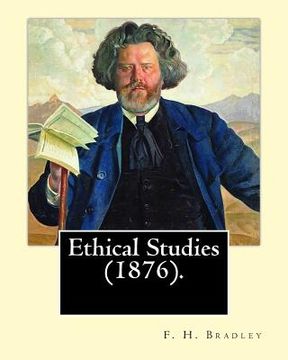Ethical Studies (1876). By: F. H. Bradley: Francis Herbert Bradley OM (30 January 1846 - 18 September 1924) was a British idealist philosopher.
Synopsis "Ethical Studies (1876). By: F. H. Bradley: Francis Herbert Bradley OM (30 January 1846 - 18 September 1924) was a British idealist philosopher."
Francis Herbert Bradley OM (30 January 1846 - 18 September 1924) was a British idealist philosopher. His most important work was Appearance and Reality (1893).Life: Bradley was born at Clapham, Surrey, England (now part of the Greater London area). He was the child of Charles Bradley, an evangelical preacher, and Emma Linton, Charles's second wife. A. C. Bradley was his brother. Educated at Cheltenham College and Marlborough College, he read, as a teenager, some of Immanuel Kant's Critique of Pure Reason. In 1865, he entered the University College, Oxford. In 1870, he was elected to a fellowship at Oxford's Merton College where he remained until his death in 1924. Bradley is buried in Holywell Cemetery in Oxford.During his life, Bradley was a respected philosopher and was granted honorary degrees many times. He was the first British philosopher to be awarded the Order of Merit. His fellowship at Merton College did not carry any teaching assignments and thus he was free to continue to write. He was famous for his non-pluralistic approach to philosophy. His outlook saw a monistic unity, transcending divisions between logic, metaphysics and ethics. Consistently, his own view combined monism with absolute idealism. Although Bradley did not think of himself as a Hegelian philosopher, his own unique brand of philosophy was inspired by, and contained elements of, Georg Wilhelm Friedrich Hegel's dialectical method.Philosophy: Bradley rejected the utilitarian and empiricist trends in English philosophy represented by John Locke, David Hume, and John Stuart Mill. Instead, Bradley was a leading member of the philosophical movement known as British idealism, which was strongly influenced by Kant and the German idealists, Johann Fichte, Friedrich Schelling, and Hegel, although Bradley tended to downplay his influences.In 1909, Bradley published an essay entitled "On Truth and Coherence" in the journal Mind (reprinted in Essays on Truth and Reality). The essay criticises a form of infallibilist foundationalism in epistemology. The philosopher Robert Stern has argued that in this paper Bradley defends coherence not as an account of justification but as a criterion or test for truth.Moral philosophy: Bradley's view of morality was driven by his criticism of the idea of self used in the current utilitarian theories of ethics. He addressed the central question of "Why should I be moral?"He opposed individualism, instead defending the view of self and morality as essentially social. Bradley held that our moral duty was founded on the need to cultivate our ideal "good self" in opposition to our "bad self".However, he acknowledged that society could not be the source of our moral life, of our quest to realise our ideal self. For example, some societies may need moral reform from within, and this reform is based on standards which must come from elsewhere than the standards of that society.He made the best of this admission in suggesting that the ideal self can be realised through following religion....................

